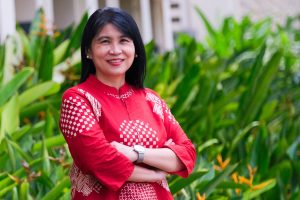Young Children’s Voices in Mathematical Problem Solving
Contributed by Dr Ho Siew Yin and Sng Wei Qin Abbie, from NTUC First Campus, for SingTeach Virtual […]
Read More
To cultivate the next generation of environmental stewards, it is important that we first gain a better understanding of how learners develop interest and knowledge towards the environment. How can an immersive informal learning experience help learners build that interest? Associate Professor Tan Aik Ling from NIE’s Natural Sciences & Science Education Academic Group shares about her research project that looks at how schools can nurture every student to develop a lifelong commitment to eco-stewardship through immersive informal learning experiences, while also integrating concepts from the geography and science curriculum.

Associate Professor Tan Aik Ling’s research project, a 3-day non-residential programme involving three secondary schools, was carried out at St John’s Island. The island, located at the southern coast of Singapore, is known for its vast biodiversity.
“St John’s Island is an ideal place as its natural habitats are preserved. We wanted to find out if students do think that various eco-systems on the island, such as mangroves, coastal forests and coral reefs are worthy to be conserved,” she says.
She explains how six activities were carried out every day, with each day divided into two blocks – one in the morning and another in the afternoon.
“In the morning, we will typically bring them outdoors to interact with nature and with one another. In the afternoon, we will usually be indoors in the St John’s Island National Marine Laboratory, which is managed by the National University of Singapore (NUS) Tropical Marine Science Institute,” she describes.
Some of the outdoor activities include going to the coastal front to learn about wave energies and exploring the mangrove swamp to study the organisms found there. Students also had the opportunity to learn about land reclamation and coral restoration at the marine laboratory.
“We created models of St John’s Island and Kias Island and had students re-enact the process of land reclamation. Through this activity, they realized how land reclamation impacts marine ecosystems such as coral reefs. The scientists in the marine laboratory then walked them through the coral restoration process as well,” she says.
According to a study done by Hidi and Renninger (2006), interest can be conceptualized in four phases: triggered situational interest, maintained situational interest, emerging (less-developed) individual interest, and well-developed individual interest.
“One of our intentions in conducting this programme is to trigger situational interest related to the environment and observe how long this interest can be maintained,” she shares.
Triggered situational interest refers to a temporary form of interest that is elicited due to a specific situation or event. This first phase is important as it piques the learner’s interest and motivates them to look up and understand the topic or content more thoroughly.
Findings from her research study indicate that the programme has been successful in triggering the interest of students on environmental issues. However, the interest falters soon after the programme ended.
“It is important to maintain the situational interest (the second phase) among learners. Certainly, there is a need for periodic stimulus after the programme has ended to sustain the participants’ interest over time,” she comments. “Perhaps future studies can be conducted to map out the ideal frequency of activities as well as the types of activities that could be run such as online exercises.”
Findings from Aik Ling’s research study have also shed light on the key design principles a successful environmental learning experience should have. She shares with us three main design principles.
“Having students engage directly with the environment is essential in piquing their interest,” Aik Ling asserts.
She emphasizes the importance of giving students more opportunities to immerse themselves in learning experiences that allow them to use their sense of touch, sight and sound in outdoor spaces.
“One of the key insights from students was that when they are exposed to nature, they feel compelled to protect nature’s biodiversity,” she shares. “After attending the coral restoration workshop, for example, they felt uplifted that they can play a role in slowing down the rate of environmental degradation.”
“One of the key insights from students was that when they are exposed to nature, they feel compelled to protect nature’s biodiversity.”
– Aik Ling, on the importance of having students connect with the outdoors
She also advocates facilitating talks by specialists in the field that can open students’ minds to new ideas. The on-site programme, for example, was facilitated by marine scientists and students were able to learn and ask questions about their various conservation efforts.
“Having experts who are able to address their questions in a logical and non-judgmental manner is important because this encourages them to be more curious,” she comments.
“One of the activities curated for the students on the last day of the programme was a free exploration of the island to complete an envisioning exercise for the island’s future. This was something that students enjoyed doing a lot,” she shares.
Running creative sandboxing activities for the students, for instance, can be one of the ways to induce positive learning experiences and let learners discover new insights about spaces that they are visiting for the first time.
Aik Ling emphasizes how the immersive learning programme is aligned to the national science and geography curriculum.
“An informal learning experience such as this allows students to connect knowledge gained in classrooms to real-world environmental issues,” she says.
She hopes that when the project ends in 2024, it can be scaled to more schools.
“More than just wanting students to develop an appreciation and care for the environment, we also want to develop them as eco-stewards for life who are empowered to take personal and collective actions in tackling environmental issues,” she affirms.
Reference
Suzanne Hidi & K. Ann Renninger (2006). The Four-Phase Model of Interest Development. Educational Psychologist, 41(2), 111-127. doi: 10.1207/s15326985ep4102_4